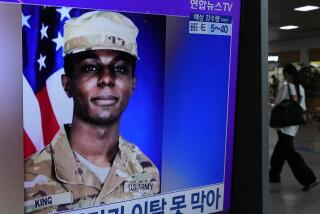U.S. Pressures S. Korea on Kim : Says Curbs Donât Help Political Development
WASHINGTON â The Reagan Administration gently increased pressure on the South Korean government Monday to lift restrictions against opposition leader Kim Dae Jung, declaring that they do not âpromote the goal of political developmentâ in that country.
However, taking pains not to offend the Seoul government, the Administration steadfastly remained neutral on the question of which side was more to blame for the melee at the airport when Kim arrived there from the United States on Friday. He was accompanied by a U.S. delegation including congressmen, a former ambassador and human rights activists.
Neither the White House nor the State Department would endorse or disavow an assertion Sunday by Richard L. Walker, the U.S. ambassador to South Korea, that some Americans accompanying Kim to Seoul âwanted the confrontation and a media event.â
The accusation was heatedly denied by Americans who returned to Washington from Seoul on Monday night.
âOne minute off the plane, we were attacked by a flying wedge of plainclothes goons,â said Robert E. White, who was the Carter Administrationâs last ambassador to El Salvador. He was one of the American delegationâs leaders.
Administration officials, by contrast, worked within the bounds of what one anonymous White House official called âquiet diplomacy.â
âThings didnât go according to the agreements that we thought we had worked out for his arrival,â Secretary of State George P. Shultz said. âThe (U.S.) traveling party didnât go as was described and the Korean government didnât react as they might have, so there was some misunderstanding there and it led to this scuffle.â
However, Shultz added, âthatâs not the main point.â He said the point--repeatedly emphasized Monday at both the White House and the State Department--was that Korea is making progress toward becoming âa more open society . . . although theyâre a long way from where weâd like to see them.â
Kim, 61, the opposition candidate in South Koreaâs last free presidential election 14 years ago, was convicted of sedition in 1980 after President Chun Doo Hwan seized power. Kim was initially sentenced to death but, under pressure from the Reagan Administration, the Korean government commuted the sentence to 20 years in prison and allowed Kim to come to the United States two years ago, ostensibly for medical treatment.
âLost in the news about the unfortunate incident at the airport was the fact that Mr. Kim was not put back in jail,â State Department spokesman Ed Djerejian said.
Since his return to Seoul, however, Kim has been detained by police at his home. The Administration declined to characterize that as house arrest.
White House spokesman Larry Speakes said: âThe Korean government says itâs not house arrest. The press says it is house arrest. . . . I donât know that itâs our responsibility or job to call it house arrest.â
Regardless of what it is called, Speakes said, reading carefully from notes, âwe would hope that Mr. Kim would have the restrictions against him lifted as soon as possible. . . . We regret steps like this and we donât believe that they promote the goal of political development in Korea. Weâre hopeful that the Korean government will move forward toward a goal of political liberalization that we all desire.â Speakes added that it is important not to dwell on current events but to focus on the future and what he said is the progress being made in South Korea, although âitâs not sufficient yet.â
As an example of progress, the White House spokesman cited legislative elections today.
Speakes also said there was no consideration being given to altering President Chunâs state visit to the White House in April. American supporters of Kim had said Sunday in Seoul that Reagan should consider postponing Chunâs visit.
Patricia Derian, assistant secretary of state for human rights in the Administration of Jimmy Carter and one of those who accompanied Kim to Seoul, said Monday night upon arriving in Washington that the South Korean government âis a military dictatorship trying to pass itself off as a democracy. And they seem to have sold that bill of goods to the Department of State. . . .
âBy the miscalculation and stupidity of the president of South Korea, all the world now knows the state of human rights in South Korea. God knows what happens to the ordinary citizen of South Korea who steps out of line.â
More to Read
Sign up for Essential California
The most important California stories and recommendations in your inbox every morning.
You may occasionally receive promotional content from the Los Angeles Times.











